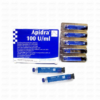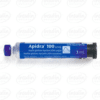The 2x Referral Bonus Event Is Now On! More Info ➡️
SAVE 10% OFF First Order With Coupon Code: WELCOME10


Our Price: $99.99

Step 1
Place Your Prescribed Apidra Cartridges Dosage In Your Cart
Step 2
Complete Checkout
Step 3
Upload Your Apidra Cartridges Prescription
(Shipping takes approximately 4-10 business days. A tracking number will be provided)
Apidra Cartridges can cause severe hypoglycemia, which can lead to seizures, unconsciousness, and death. Patients should be closely monitored for signs of hypoglycemia, and their insulin dosage should be carefully adjusted. The medication should only be used under the supervision of a healthcare provider.
Common side effects of this medication include: hypoglycemia, allergic reactions, lipodystrophy, itching, rashes and weight gain.
Skin irritations may occur at the site of injection, which includes redness, swelling, and hard lumps (lipodystrophy). To avoid this from happening, do not skip meals and monitor your blood sugar levels regularly.
It is not recommended to smoke or drink excessively, as these can impact blood sugar levels.
If you are pregnant or breastfeeding, let your doctor know before starting this treatment (see pregnancy tab for more information)
Do not use this medication if your blood sugar levels are low (hypoglycemia). Please consult your doctor if you have any heart, liver, or kidney problems before starting treatment.
Apidra 100IU Cartridge is a fast-acting form of insulin that helps manage blood sugar levels effectively by replacing the insulin that is typically produced by the body.
As a result, glucose can enter the cells for the body to use as energy. Blood glucose levels are dropped within 10-20 minutes of injection and can last up to 3-5 hours. Speak with your doctor about how to properly administer the injection for effectiveness.
Some medicines cause changes in the blood sugar level (decrease, increase, or both depending on the situation). In each case, it may be necessary to adjust your insulin dose to avoid blood sugar levels that are either too low or too high. Be careful when you start or stop taking another medicine.
Tell your doctor or pharmacist if you have recently taken or might take any other medicines. Before taking a medication, ask your doctor if it can affect your blood sugar level and what action, if any, you need to take.
Medicines that may cause your blood sugar level to fall (hypoglycemia) include:
-all other medicines to treat diabetes,
-angiotensin-converting enzyme (ACE) inhibitors (used to treat certain heart conditions or high blood pressure),
-disopyramide (used to treat certain heart conditions),
-fluoxetine (used to treat depression),
-fibrates (used to lower high levels of blood lipids),
-monoamine oxidase (MAO) inhibitors (used to treat depression),
-pentoxifylline, propoxyphene, salicylates (such as aspirin, used to relieve pain and lower fever),
-sulphonamide antibiotics.
Medicines that may cause your blood sugar level to rise (hyperglycemia) include:
-corticosteroids (such as “cortisone” used to treat inflammation),
-danazol (medicine acting on ovulation),
-diazoxide (used to treat high blood pressure),
-diuretics (used to treat high blood pressure or excessive fluid retention),
-glucagon (pancreas hormone used to treat severe hypoglycemia),
-isoniazid (used to treat tuberculosis),
-estrogens and progestogens (such as in the contraceptive pill used for birth control),
-phenothiazine derivatives (used to treat psychiatric disorders),
-somatropin (growth hormone),
-sympathomimetic medicines (such as epinephrine [adrenaline], salbutamol, terbutaline used to treat asthma),
-thyroid hormones (used to treat thyroid gland disorders),
-protease inhibitors (used to treat HIV),
-atypical antipsychotic medicines (such as olanzapine and clozapine).
Your blood sugar level may either rise or fall if you take:
-beta-blockers (used to treat high blood pressure),
-clonidine (used to treat high blood pressure),
-lithium salts (used to treat psychiatric disorders).
Pentamidine (used to treat some infections caused by parasites) may cause hypoglycemia which may sometimes be followed by hyperglycemia.
Beta-blockers, like other sympatholytic medicines (such as clonidine, guanethidine, and reserpine), may weaken or suppress entirely the first warning symptoms, which help you to recognize hypoglycemia. If you are not sure whether you are taking one of those medicines, ask your doctor or pharmacist.
Hypoglycemia may occur due to an excess of insulin activity relative to food intake and energy expenditure.
There are no specific data available concerning overdoses with insulin glulisine. However, hypoglycemia may develop over sequential stages.
Mild hypoglycaemic episodes can be treated by oral administration of glucose or sugary products. Therefore, it is recommended that the diabetic patient constantly carries some sugar lumps, sweets, biscuits, or sugary fruit juice.
Severe hypoglycaemic episodes, where the patient has become unconscious, can be treated by glucagon (0.5 mg to 1 mg) given intramuscularly or subcutaneously by a person who has received appropriate instruction or by glucose given intravenously by a healthcare professional. Glucose must also be given intravenously if the patient does not respond to glucagon within 10 to 15 minutes.
Upon regaining consciousness, administration of oral carbohydrates is recommended for the patient to prevent relapse.
After an injection of glucagon, the patient should be monitored in a hospital to find the reason for this severe hypoglycemia and prevent similar episodes.
There are no or limited amount of data (less than 300 pregnancy outcomes) from the use of insulin glulisine in pregnant women.
Animal reproduction studies have not revealed any differences between insulin glulisine and human insulin regarding pregnancy, embryonal/foetal development, parturition or postnatal development.
Caution should be exercised when prescribing to pregnant women. Careful monitoring of glucose control is essential.
It is essential for patients with pre-existing or gestational diabetes to maintain good metabolic control throughout pregnancy. Insulin requirements may decrease during the first trimester and generally increase during the second and third trimesters. Immediately after delivery, insulin requirements decline rapidly.
It is unknown whether insulin glulisine is excreted in human milk, but in general insulin does not pass into breast milk and is not absorbed after oral administration.
Breast-feeding mothers may require adjustments in insulin dose and diet.
Animal reproduction studies with insulin glulisine have not revealed any adverse effects on fertility.
The patient’s ability to concentrate and react may be impaired as a result of hypoglycaemia or hyperglycaemia or, for example, as a result of visual impairment. This may constitute a risk in situations where these abilities are of special importance (e.g. driving a car or operating machines).
Patients should be advised to take precautions to avoid hypoglycaemia whilst driving. This is particularly important in those who have reduced or absent awareness of the warning symptoms of hypoglycaemia or have frequent episodes of hypoglycaemia. The advisability of driving should be considered in these circumstances.
It is necessary to store the cartridge at room temperature for one to two hours before inserting it into the OptiClik pen. You must remove air bubbles from the cartridge before injection. Don’t refill empty cartridges.
Before you use the cartridge, check it out. The solution must be clear, colourless, and free of visible particles before it can be used. Shaking or mixing it before use is not recommended.
Keep this medicine out of reach from children. Keep in the refrigerator between 2-8°C and do not freeze. Keep inside the cart and away from direct light or heat
Do not use the medication if it is past the expiry date.
Do not use if medication appears colorless or clear.
Once opened, it can be stored for a maximum of 4 weeks in the outer carton
Discard within 28 days of first use
Spare cartridges should also be discarded after 28 days after being removed from the refrigerator.
When disposing of cartridges, do not throw them away in waste or down wastewater. Speak to your pharmacist about disposing of any unused medication. Best practices for disposing of medication helps protect the environment.
Many Americans are buying insulin from Canada to save themselves thousands per year. Our prescription service allows American diabetics to obtain their medication through our trusted and secure pharmacy.
It’s easy! Add whatever products you have been prescribed and upon check out, please upload your prescription. From there we will do the rest! Our pharmacists will review your prescription and once approved, Insulin Outlet will ship your medication to your doorstop!
At Insulin Outlet, we ensure the safety and quality of our medications, meeting all federal legislation standards. Your order will be dispatched from a reputable licensed Canadian pharmacy, guaranteeing the highest standards of reliability and authenticity. This medication has been approved by Health Canada (Canada's FDA) and is identical to what you would receive in the US, only with Canadian labeling and packaging. We do not sell counterfeit or unauthorized medications. Our discounted medications are shipped directly from Canada to your doorstep, providing a fast and secure delivery experience. To conveniently buy Apidra Cartridges online at a significant discount, place your order above or call us at 1-888-238-0872.
